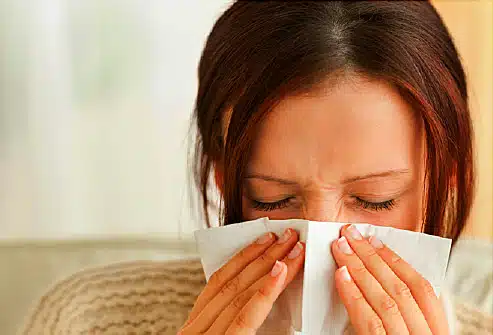
By the time we are born we have been exposed to thousands of chemicals that would be unnatural to us if we lived in the wild.
Children in cities no longer play outside in the dirt on a regular basis so their immune systems do not develop the robustness of previous generations.
In the home too we have so many unnecessary chemical-based disinfectants and cleaners that make our environment too sterile so the immune system does not rise to the challenge of fighting infection. At times it becomes over-active in reacting to substances that would not normally cause an immune response.
So what is an allergy?
An allergy is an inappropriate immune response to a substance. That substance can with be organic or inorganic. The response may be to a single substance, a range of similar substances or in some cases people develop multiple allergies to many substances.
Some of the biggest reactions today are to medication that frequently result in people being admitted to hospital. This is why more people are turning to natural remedies. Reactions of course are highly individual and no two people are exactly the same, even twins.
What are the common symptoms of allergies?
• Skin rashes or hives
• Watering eyes
• Runny nose
• Shortness of breath
• Closing of the throat (anaphylaxis)
• Stomach ache
• Diarrhoea
• Numbness
• Sweating or shivering
• Dizziness or fainting
• Alteration of vision or hearing
• Fainting or drowsiness
• Headaches or hyper-alertness
• Strange behaviour or psychosis
You may know what triggers your allergies or you may have allergic reactions and not know what you are allergic to, which can prove very frustrating.
Allergies can also start at any time of your life and sometimes to something that you may have not been allergic to before, for reasons not known.
It is very important to start tracking down what you are allergic to.
This can only be done by careful eliminating things from your life and seeing what happens while recording the results. It is import to be scientific about this process so you can unravel the puzzle, whether it be food, chemicals, dust, smells or even certain kinds of animals.
There are various kinds of allergy tests which can be useful but you may test positive to a substance in the test and it simply does not bother you and you get no reaction.
The only true way to manage an allergy is to know the allergens.
It is important to see a health professional who can help you and not just struggle on your own.
So what can you do if you have an allergy?
• Sooth skin rashes or hives with Aloe Vera
• Work on identifying the allergens in conjunction with a health professional, such as a naturopath
• Do the very best you can to eliminate those allergens from your diet and life
• If you experience anaphylaxis you should carry an epipen (adrenaline) with you at all times
• If you experience an anaphylactic episode, get urgent medical help
• Wear an allergy bracelet if you are anaphylactic
• Be clear with other people about what you are allergic to: just tell them
• Under a healthcare professional, you may try a desensitisation program
• Herbs and medications can reduce allergic reactions
• Avoid stress as it promotes allergies

